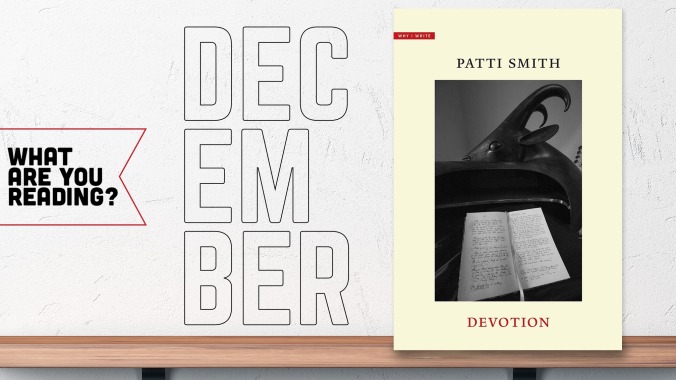What are you reading in December?

In our monthly book club, we discuss whatever we happen to be reading and ask everyone in the comments to do the same. What Are You Reading This Month?
Kelsey J. Waite
It’s surprising that only now—40 years into her prolific, diverse literary career—has Patti Smith published anything on the craft of writing. But Devotion, adapted from a lecture she gave for Yale University Press’ Why I Write series, delivers an insightful, experiential look into the iconic punk poet’s creative process. The book is divided into three sections, with a work of fiction framed by two nonfiction writings. First comes “How The Mind Works,” a fluid travelogue in the style of 2015’s M Train that follows the writer on an overnight trip from Paris to Southern France and back. Rendered in her impressionistic style, it weaves a dreamlike montage of images and memories (and appearances by Smith’s own idols like Simone Weil and Arthur Rimbaud), introducing us to many of the conversations, characters, and landscapes that coalesce into part two, the short story also titled “Devotion.” The piece tells of a young female ice skater’s passionate but brief relationship with an ultimately overbearing man. It is tender and striking, cutting a singed, bulletlike hole through the book’s center, but more than that, it serves to illustrate how experiences can alchemize into a work of art. In part three, a postscript titled “A Dream Is Not A Dream,” Smith addresses the topic of writing more directly while retracing an encounter with Albert Camus’ final manuscript. “What is the dream?” she asks. “To write something fine, that would be better than I am, and that would justify my trials and indiscretions. To offer proof, through a scramble of words, that God exists.” At just 93 pages, Devotion is slim, but it’s packed with enough passion and contagious energy to move readers to tune into their own inspirations and—whatever their medium—get to work.
Clayton Purdom
I’m reading Moby Dick. I’m not even sure how this happened. I have never read Moby Dick, nor do I know much about Moby Dick, besides that it is The Great American Novel and everyone gets sick of it halfway through when it devolves into a massively detailed explanation of 19th-century whaling equipment. I wanted something to read to my very small, generally sleeping infant son and did not want it to be a children’s book since he’s far too young to even understand what’s going on in whatever I read, and so I thought, “Why don’t I give Moby Dick a shot?” Now I’m reading Moby Dick. The thing about Moby Dick that I sort of remember from my previous experiences with Melville is that, for all his overgrown sentences and brain-breaking word choices, there’s a sort of comforting woolliness to them, the way they tumble on forever and ever. They’re fun to read aloud, at least, and with nice, short chapters that I can do in a single sitting. There’s also an overwrought, gothic melodrama to his phrasings that, when I can deliver a sentence convincingly, is really satisfying. The real question is: Will I finish Moby Dick? I do not know. I’m thinking of trying Finnegans Wake next, either way.
Caitlin PenzeyMoog
With Philip Pullman’s new trilogy continuing the story of Lyra he began in His Dark Materials, it’s a good time to give the original trio a re-read. So that’s what I’ve done. The Golden Compass (The Northern Lights in England) is just as good as I remember it: the world-building is truly a feat, and Lyra is one of the best characters ever written. The Subtle Knife suffers from problems plaguing many bridging narratives, in that it is mostly in service of getting our characters to where they’ll need to be for the big finale in The Amber Spyglass. Read back-to-back, the three flow into each other well, though, even if The Subtle Knife feels like throat-clearing for the real deal. And what a trilogy cap The Amber Spyglass is. I’d forgotten just how daring Pullman is in those pages, showing how the powerful church, God, and religion are, in general, forces of evil. He’s audacious in his take on Christianity in a way that’s hard to imagine a comparable fantasy author like J.K. Rowling ever being.